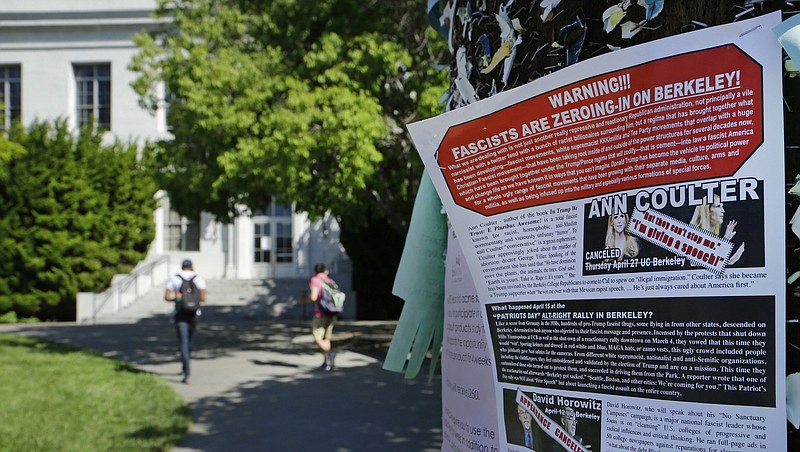Ann Coulter is a bona fide conservative but not necessarily our cup of tea. We might walk across the street to hear her rants but not if the evening were more conducive to a relaxing walk in the park.
But she has a right to her ideas as much as those on the ideological left of the political spectrum, which is just about everyone in the Democratic Party today.
Coulter, though, has run into the same resistance that has become all too common against conservatives these days. Her thoughts are not welcomed on some college campuses, where free thought once was celebrated but now is tolerated only when it comes from the left.
Specifically, she was asked to speak by campus Republicans at the University of California at Berkeley, which is often cited as the birthplace of the free speech movement. Mindful of the reaction to conservative Milo Yiannopolous on the same campus in February, when leftists incited violence, the university canceled the speech.
When Coulter engaged the university, suggesting students who engaged in violence could be expelled, administration officials relented, helpfully suggesting the speech could be delivered when there were no students on campus.
Brilliant.
Now a lawsuit has been filed against the school by the Berkeley College Republicans and the Young America's Foundation, which was helping organize and finance the event.
The lawsuit says in part the university is trying "to stifle the speech of conservative students whose voices fall beyond the campus political orthodoxy."
In truth, the political center is beyond campus political orthodoxy. But we digress.
"The university is required to give equal access to speakers of different viewpoints," Harmeet Dhillon, attorney for the plaintiffs, maintained.
Not so long ago, that's what college was for. In the ivy halls of higher learning, students heard things that challenged what they believed to be true, that differed from conventional wisdom, that made them defend what they knew to be right, that asked them to compare and contrast two sides of an issue.
Too often today, though, students are not exposed to a range of thoughts. Instead, whatever the ideological left viewpoint is - from politics to science to culture - is gospel. No other theory is tolerated, and violence is necessary if other viewpoints are raised.
That's how we arrived at the recent attacks on and/or protests of Yiannopolous, Charles Murray at Middlebury College, Richard Spencer at Auburn University and Ben Shapiro at California State, among others.
Just two days ago, a New York University professor suggested in The New York Times that "definitions of free speech" should be revised and that "freedom of expression is not an unchanging absolute."
Controversial - read, conservative - viewpoints, according to the author, Ulrich Baer, may be obtained on the internet, "where all kinds of offensive expression flourish unfettered on a vast platform available to nearly all."
Freedom of speech, instead, should mean "balancing the inherent value of a given view with the obligation to ensure that other members of a given community can participate in discourse as fully recognized members of that community," he wrote.
However, when those with one ideological viewpoint are allowed to determine the meaning of the critical words "inherent value," "given view," "given community," "participate," and "fully recognized members," the thought itself loses significant meaning.
The push toward campus censorship of thoughts on the right did not begin with the election of Donald Trump but grew powerful legs during the presidency of Barack Obama, where such thoughts - though not in so many words - were welcomed.
The unexpected election of Trump, though, has served as a flashpoint for more fierce resistance - violence, if necessary.
Interestingly, the campus intolerance incident has drawn some strange bedfellows for the conservative would-be speaker. In recent days, Sen. Bernie Sanders, I-Vt., Sen. Elizabeth Warren, D-Mass., darlings of the far left, and liberal commentator Bill Maher have spoken out against Berkeley's policy.
Sanders referred to it as "intellectual weakness," while Maher called it "the liberals' version of book burning." Warren complained that the incident has only given Coulter a bigger platform. "My view is, let her speak and just don't show up," she said.
Or, better yet, show up, and allow the political commentator's pronouncements to ruminate. Some on the left and right will leave more solid in their ideological bents. Others may depart with something to think about, one idea of hers having sickened a previous fan on the right and another idea having sparked a ray of light in a previous opponent on the left.
And isn't that what the freedom of expression is supposed to do?
